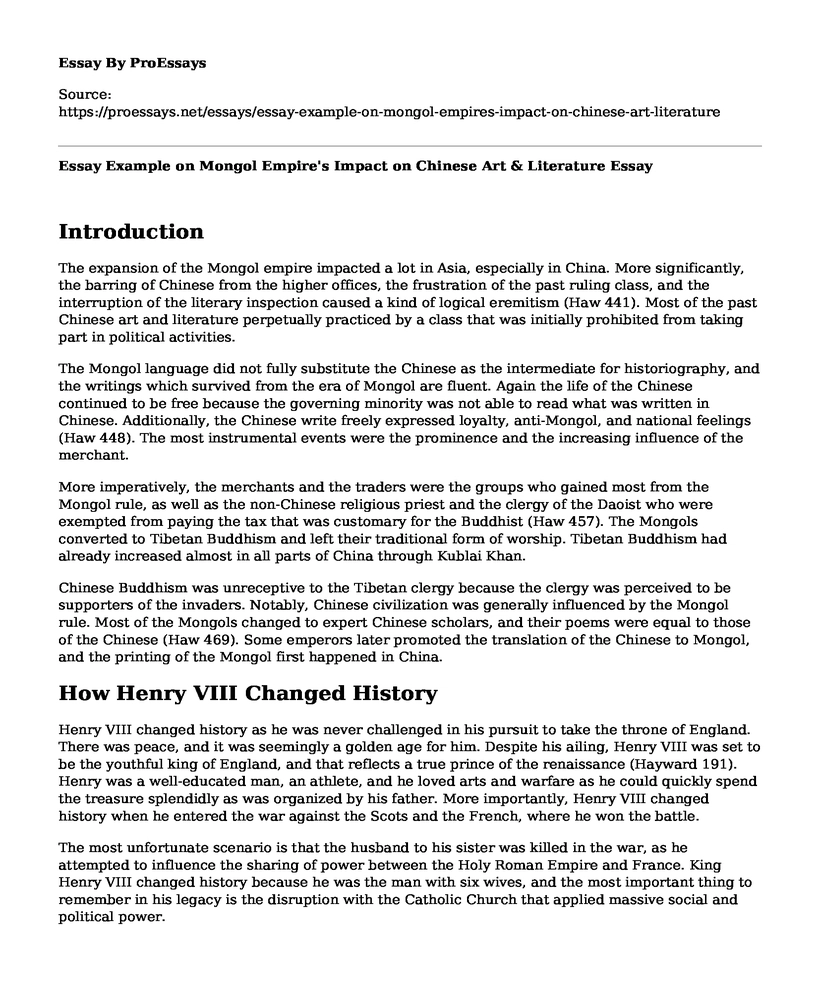Introduction
The expansion of the Mongol empire impacted a lot in Asia, especially in China. More significantly, the barring of Chinese from the higher offices, the frustration of the past ruling class, and the interruption of the literary inspection caused a kind of logical eremitism (Haw 441). Most of the past Chinese art and literature perpetually practiced by a class that was initially prohibited from taking part in political activities.
The Mongol language did not fully substitute the Chinese as the intermediate for historiography, and the writings which survived from the era of Mongol are fluent. Again the life of the Chinese continued to be free because the governing minority was not able to read what was written in Chinese. Additionally, the Chinese write freely expressed loyalty, anti-Mongol, and national feelings (Haw 448). The most instrumental events were the prominence and the increasing influence of the merchant.
More imperatively, the merchants and the traders were the groups who gained most from the Mongol rule, as well as the non-Chinese religious priest and the clergy of the Daoist who were exempted from paying the tax that was customary for the Buddhist (Haw 457). The Mongols converted to Tibetan Buddhism and left their traditional form of worship. Tibetan Buddhism had already increased almost in all parts of China through Kublai Khan.
Chinese Buddhism was unreceptive to the Tibetan clergy because the clergy was perceived to be supporters of the invaders. Notably, Chinese civilization was generally influenced by the Mongol rule. Most of the Mongols changed to expert Chinese scholars, and their poems were equal to those of the Chinese (Haw 469). Some emperors later promoted the translation of the Chinese to Mongol, and the printing of the Mongol first happened in China.
How Henry VIII Changed History
Henry VIII changed history as he was never challenged in his pursuit to take the throne of England. There was peace, and it was seemingly a golden age for him. Despite his ailing, Henry VIII was set to be the youthful king of England, and that reflects a true prince of the renaissance (Hayward 191). Henry was a well-educated man, an athlete, and he loved arts and warfare as he could quickly spend the treasure splendidly as was organized by his father. More importantly, Henry VIII changed history when he entered the war against the Scots and the French, where he won the battle.
The most unfortunate scenario is that the husband to his sister was killed in the war, as he attempted to influence the sharing of power between the Holy Roman Empire and France. King Henry VIII changed history because he was the man with six wives, and the most important thing to remember in his legacy is the disruption with the Catholic Church that applied massive social and political power.
Henry VIII focused more on the Roman Catholic, where he wrote the pamphlet that was against the opinion of Martin Luther, who was the German activist, and the Catholic Pope appointed him the Faith Defender. Therefore, he reformed England and made it a Protestant nation. Henry took advantage of the bandwagon effect of religious reform. Eventually, the Supremacy Act that was passed in 1534 led to the establishment of the England Church, and Henry became the head, and that is when Britain transformed forever (Hayward 194).
More imperatively, Henry appointed himself the Ireland King, and the lords of Irish were forced to change their Gaelic titles to English title as the vassals of England, and that triggered a war between the English and the Irish that led to the Tudor period (Hayward 197). Finally, several forms of religious prosecutions took place, as several individuals were tortured and forced to recant their beliefs.
Works Cited
Haw, Stephen G. "The Mongol Empire-the first 'gunpowder empire'?." Journal of the Royal Asiatic Society 23.3 (2013): 441-469.
Hayward, Maria. Dress at the Court of King Henry VIII. Routledge, 2017: 191-197
Cite this page
Essay Example on Mongol Empire's Impact on Chinese Art & Literature. (2023, Mar 02). Retrieved from https://proessays.net/essays/essay-example-on-mongol-empires-impact-on-chinese-art-literature
If you are the original author of this essay and no longer wish to have it published on the ProEssays website, please click below to request its removal:
- Research Paper on Evidence of the Use of the Tool of Hyperbole in the Great Dictator by Charlie Chaplin
- America Policing the World - Essay Sample
- Two Views of the Great Depression (1932) Essay Example
- Virgil's Epic: Was Turnus' Death Justified? - Essay Sample
- Essay Example on WW1: Empires Fall, Nations Rise, US Joins Global Conflict
- Essay Example on 60s/70s US Domestic Politics: Protests, Activism, New Imagination
- Essay Sample on Importance of Rivers in First Civilization







